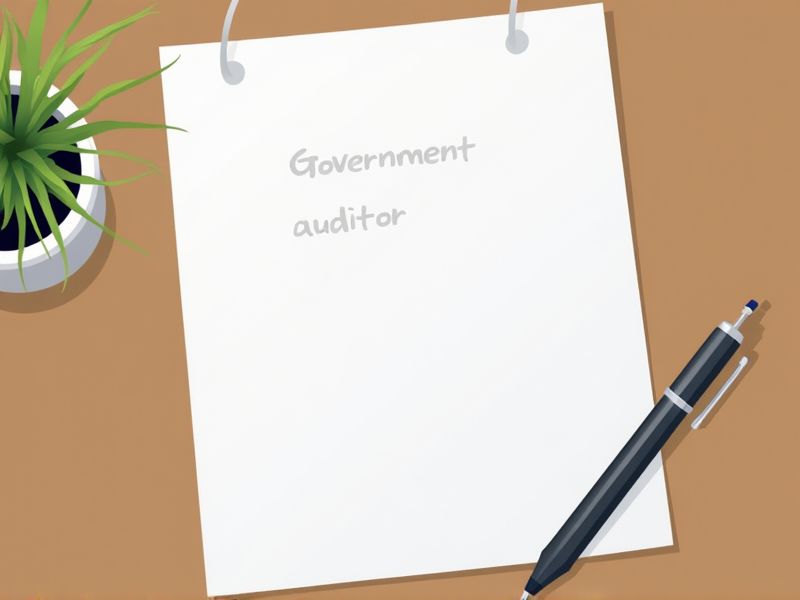
Government auditors play a critical role in ensuring fiscal responsibility and regulatory compliance, making specialized certifications essential for credibility and effectiveness. These certifications validate an auditor's knowledge in handling complex government financial systems and emphasize proficiency in detecting and preventing fraud. Public sector regulations and standards differ significantly from private sector practices, necessitating a distinct skill set that certifications can provide. Explore these key certifications crucial for a career in government auditing.
Certified Government Auditing Professional (CGAP)
Government auditors face unique challenges due to the complexity of public sector operations and regulations. Obtaining a Certified Government Auditing Professional (CGAP) designation provides a formal acknowledgment of expertise in government auditing principles and practices. This certification enhances the auditor's ability to identify inefficiencies and ensure compliance with governmental policies. Agencies recognize CGAP as a mark of professional integrity and competence, often leading to better career opportunities and trust in public sector audits.
Certified Government Financial Manager (CGFM)
Possessing a CGFM certification enhances the credibility of a government auditor by demonstrating expertise in governmental accounting, auditing, and financial management. This knowledge ensures adherence to regulations and standards, reducing the risk of financial mismanagement and inefficiencies. As governmental processes and requirements are complex and ever-changing, a CGFM prepares auditors to effectively navigate these challenges. The certification also promotes ethical standards, which is crucial in maintaining public trust in the management of government funds.
Certified Internal Auditor (CIA)
Certified Internal Auditors bring a recognized standard of expertise, which leads to enhanced credibility and compliance in government auditing. Their systematic approach to risk assessment improves the accuracy of financial reporting and resource allocation. The CIA designation equips auditors with skills in detecting fraud, thus safeguarding public assets. By ensuring adherence to international auditing standards, CIAs help maintain transparency and trust in governmental operations.
Certified Public Accountant (CPA)
A Certified Public Accountant (CPA) is crucial for government auditing because they possess specialized knowledge in accounting principles and regulations. Government auditors require CPAs to ensure adherence to legal and financial compliance, reducing the risk of fraud or mismanagement. Their expertise in assessing financial statements and internal controls improves the accuracy and reliability of financial reporting for government entities. CPAs help maintain public trust by upholding rigorous auditing standards in government operations.
Certified Fraud Examiner (CFE)
Government auditors often encounter complex fraud schemes that can disrupt public service efficiency; a Certified Fraud Examiner (CFE) is specifically trained to detect and investigate such fraudulent activities. CFEs possess specialized knowledge in examining financial transactions and understanding legal aspects, which equips them to identify irregularities more effectively than non-certified auditors. When CFEs work with government auditors, they enhance the government's ability to safeguard public funds and ensure compliance with anti-fraud regulations. The collaboration between government auditors and CFEs helps maintain public trust by ensuring transparency and accountability in governmental operations.
Certified Information Systems Auditor (CISA)
Government auditors require the Certified Information Systems Auditor (CISA) qualification to effectively evaluate and ensure the integrity of information systems and technology. The increase in cyber threats and technology-driven processes has heightened the need for auditors who can comprehensively assess IT controls and security measures. CISA certification equips auditors with the specific skills to mitigate risks and comply with governmental regulations and standards. Governments face extensive auditing requirements, and the CISA qualification provides a standardized, globally recognized benchmark for competence in evaluating information system controls.
Certified Risk Management Assurance (CRMA)
Government auditors face complex environments with evolving risks. Certified Risk Management Assurance (CRMA) equips them with the skills to effectively identify, assess, and manage these risks. Having the CRMA enhances their ability to ensure compliance with regulations and optimize internal controls. This certification also reinforces confidence among stakeholders by demonstrating the auditor's commitment to proficient risk management practices.
Certified in Risk and Information Systems Control (CRISC)
Government auditors face complex technological environments that require a deep understanding of risk management; CRISC certification equips them with this expertise. Increased regulatory requirements demand that auditors possess advanced knowledge in assessing and managing IT risks, which CRISC provides. CRISC-certified auditors can more effectively communicate risk management strategies to stakeholders, enhancing decision-making processes. As government agencies prioritize information security, CRISC-certified professionals are preferred due to their specialized skills in mitigating and controlling IT risks.
Certified Audit Executive (CAE)
The presence of a Certified Audit Executive (CAE) in government auditing ensures adherence to established auditing standards, resulting in increased credibility for audit findings. CAEs bring expertise in risk management and control processes, enabling more accurate identification and mitigation of potential government inefficiencies. With their certification, CAEs enhance the quality and consistency of audits, fostering public trust and accountability in government operations. CAEs also play a crucial role in advising government entities on improvements and strategies, driving better fiscal responsibility and governance.
Project Management Professional (PMP)
Government auditors benefit from Project Management Professional (PMP) certification as it ensures they possess the skills to effectively plan, execute, and manage complex audit projects. The certification equips auditors with standardized methodologies, enhancing consistency and accuracy in audit processes. PMP-trained auditors are better at risk management and can anticipate potential issues, leading to more reliable and credible audit outcomes. With the ability to efficiently manage resources and timelines, PMP-certified auditors contribute to more efficient government operations.
Summary
You can expect enhanced trust in the auditor's capabilities when a government auditor obtains relevant certifications. This specialized training leads to improved audit processes and accuracy, directly impacting the quality of audits conducted. Certified auditors tend to implement stronger compliance controls, reducing instances of fraud or mismanagement. Stakeholders benefit from more transparent and credible reports, bolstering public confidence in governmental operations.
